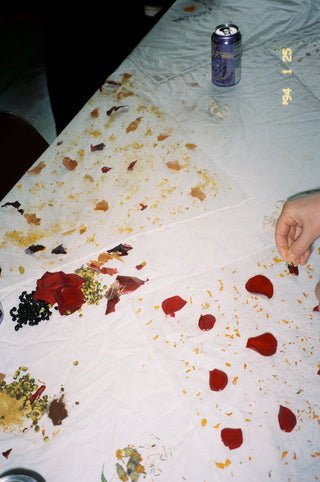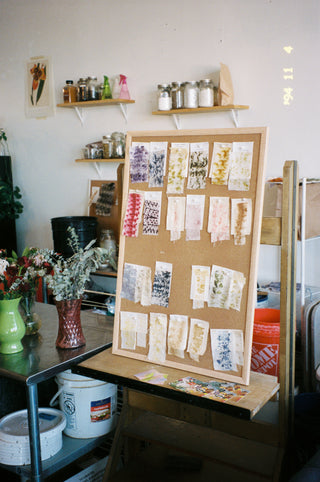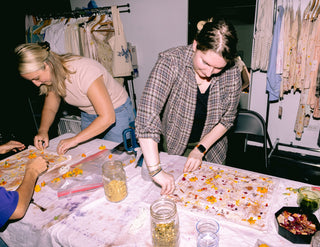

The Natural Dye Process

Step 1: Fabric Preparation
Material that can be naturally dyed falls into two categories, Animal fibers (protein) and Plant fibers (cellulose)
Natural Dyes only take to natural fibers, you can find 100% silk, cotton, & linen being used at Laila Textiles. Depending on what fabric type is being used, the fabric goes through a scorching process following a mordant bath.
The scorching process cleans the fabric from oils, dirt, or wax that could be on the fibers.
The mordant bath prepares the fabric to receive the color and “bite” onto the fabric. We use various mineral salts to prepare our mordant baths.

Step 2: Naturally Dyeing Fabric
There are a few methods we use to extract color from plants and natural sources. The method we use is bundle dyeing, this method uses steam and close contact between the plant material & fabric to extract color.
Dye Process
Once the dye is prepared and all the color is extracted from the natural sources, the dying process can begin.
Immersion Dyeing produces a dye pot where the fabric can be submerged until the color desired is achieved.
Bundle Dyeing is a more lengthy process where the floral scraps, plants, or food waste are placed onto the fabric by hand and then wrapped tightly with the fibers. The bundles are then tied with string and placed in a steam basket. Slowly, the fibers are filled with steam and the heat prints the color & shapes.

Step 3: Final Touches
After the fabric is dyed, it is washed by hand or machine washed with cold water and natural pH neutral soap. Visit our Garment Care Page to learn more about how to care for natural dyed fabric.
After fabric is washed, it is hung up in our studio to air dry. Once dried our team carefully irons, sews in all tags, & packages it up to be sent off!
Sustainability Commitment
Suppliers
At Laila Textiles we care deeply about sourcing our fabric and apparel from responsible companies & manufactures.
Silk Manufacturing Teams
Our Silk Apparel Collection is comprised of both found second hand garments and items manufactured in Dongguan, Guangdong, China. Our Manufacturing Partner is committed to ethical fair trade practices to prevent exploitation of workers or natural resources in the manufacturing of clothing. All fabrics are made in accordance to international standards and environmental laws. What this looks like for employees -
- All Employees are paid a living wage
- All Employees are provided Medicare, Social Security, Pensions, and PTO for Festivals & Holidays
- They do not have forced labor practices, which means that no one is forced to work overtime against their wishes and if they do work overtime, there is an extra overtime pay allowance
- Their manufacturing facilities are equipped with proper lighting & sanitation facilities and the working conditions and equipment are safe as possible to prevent work-related injuries
- They are both ISO 9001 & BSCI certified
Our Silk Accessories & Home Goods are manufactured in Jiaxing, China. The manufacturing team we partner with is committed to ethical practices. What this looks like for Employees -
- All Employees are paid a living wage
- All Employees are provided Medicare, Social Security, Pensions, and PTO for Festivals & Holidays
- They do not have forced labor practices, which means that no one is forced to work overtime against their wishes and if they do work overtime, there is an extra overtime pay allowance
- Their manufacturing facilities are equipped with proper lighting & sanitation facilities and the working conditions and equipment are safe as possible to prevent work-related injuries
- They are Smeta, Amfori BSCI, EcoVero, Organic Textile Standard, Workplace Conditions Assessment certified
____________________________________
Most of our additional items are sourced from a family run textile supplier in San Rafael, CA. This small family-run supplier actively promotes fare trade and has strict policies against sourcing from manufactures that allow underage & bonded labor.
Product Creation
Dye Material - We source our dye materials from saved kitchen scraps, our natural dye garden, floral waste from grocery stores or florist & by partnering with natural dye plant farms. All dye used in our practice is prepared and extracted from plants/ natural sources in our Chicago Dye Studio. If we do not have access to the natural dye materials we need, we outsource to trusted companies & farms for the materials.
Sewn in House - Our local Chicago Team currently Sews several of our items. Our silk scrunchies, select skirts, and select tank tops are all created & sewn in our Chicago Studio.
Composting, Recycling, Controlling Waste - Plant scraps that are used for dye are composted in our studio. We also do our best to recycle and reuse all other items when possible. When we can, we use reusable items in our studio to cut down on waste.
When purchasing materials for projects we always look to second-hand stores and art centers first to supply our needs.
Products that have small imperfections are either donated or sold at a lower price to cut down on our textile waste. We also use fabric scraps to create new items.
Packaging & Shipping - All Laila Textiles products are mailed in compostable or recyclable packaging.



